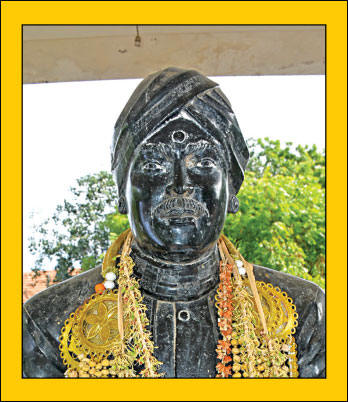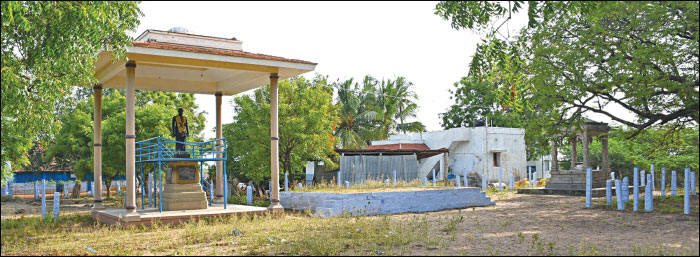Sakthi Vikatan. Sep 11, 2018 Posted Date: 06:00 (28/08/2018) August 28, 2018
திருவருள் செல்வர்கள்! - 10 - அண்ணாமலைக் கவிராயர்
Divine-Grace Staretsy – 10 – Aṇṇāmalai Kavirāyar
பி.என்.பரசுராமன் P.N.Parasuraman
எல்.ராஜேந்திரன் L. Rajendran
The father stopped sending him to school. When he was ten years of age, he trained him to plow the lands. He instructed the boy, “Whoever asks you to do the work, you must do it. Don’t forget to collect the wages upon completion of the work.” The boy did what the father told him. 2
The boy had a great desire to become conversant with literate Tamil. Though he desired, what was he to do? He had to work to earn his daily meals. Where was he to go for his education? 3

Two years went by. The days the boy had no work, he spent his time in a Mutt. A lucky turn of events took place for the boy. Mahāṉ Sundara Aṭikaḷ came to the Mutt. As a lover of Tamil, he was a literary man. He went to the Mutt to rehabilitate and improve the conditions in the Mutt. 4
The boy was close to him. He borrowed Tamil books and read them eagerly. The Aṭikaḷ, observing his exceptional aptitude for Tamil arranged for food and lodging in the Mutt. 5
Because of it, the boy stopped going to work. Upon discovery, the father of the boy was angry. He came straight to the Mutt, beat the boy up and pushed him. Aṭikaḷ’s mind was heavy with sorrow. “Why are hitting him?” The father said, “In the house, we do not have Kūz (Ragi porridge) in the house. This boy wastes his time here in the Mutt. Only when he works and earns wages, he can eat.” That was his argument. 6
Aṭikaḷ comforted the father and said, “Your boy has a great aptitude for learning. Because of his eagerness, I keep him here and teach him his lessons. You do not have to worry about his food and a roof over his head. Let him stay with me.” 7
Unable to challenge and override Aṭikaḷ’s words, the father returned home half-heartedly. 8
What are we dealing with: The father’s poverty, the boy’s love of Tamil, Aṭikaḷ’s compassion or all of the above? Whatever it is, that boy’s poem, ‘Kāvaḍi Sindhu’ is well known in the world of Tamil. 9

Yes, ‘Kāvaḍi Sinthu’ brings us the memory of only Aṇṇāmalai Reddiar. 10
Aṇṇāmalai Reddiar was born in Seṉṉikuḷam in 1861. His parents were Seṉṉava Reddiar and ōvu Ammāḷ. Even in the tender age, he was interested in education and read Thiruppukaz. He was devoted to Muragapperumāṉ and received Ārumugam’s grace in full. The result was the rare treatise, ‘Kāvaḍisinthu.’ Did we not see him under the tutelage and support of Sundara Aṭikaḷ? Let us explore it. 11
Aṇṇāmalai under the tutelage of Aṭikalār learned Tamil in great depth. Aṭikalār introduced him to the king for his support. The king Sundararāsu was a devotee of Tamil. Aṇṇāmalai presented his poems to the king. 12
The verses enchanted the king, who thought of testing him further. He told Aṇṇāmalai, “Use the word Kārikai (காரிகை = woman) in seven places and construct a poem.”13
Aṇṇāmalai sang a poem immediately. The king was surprised to hear the extemporaneous poetry. He decided, “This man is capable of constructing a poem impromptu.’ Aṭikalār requested the king to arrange teaching of grammar to him. Annamalai having been accepted by the king stayed there with the king and became a great Tamil grammarian. He took leave of the king after completion of his studies and came back to Seṉṉikuḷam. 14

Though the flowers are on the tree for us to see their beauty, their fragrance spreads all around far beyond our sight. Likewise, though Aṇṇāmalai was in Seṉṉikuḷam, his reputation was widespread. Marudappa Devar a great landlord (Land Baron) appointed him as the poet of the local assembly. Aṇṇāmalai sang multiple kinds of songs. 15
Aṇṇāmalai immersed in the study of Thiruppukaz and enjoying it, became interested and enthused to sing songs of praise of Murugan. He sang Kāvaḍisinthu in honor of Kazukumalai Kandaperumān. When the Great Land Baron from Uṛṛumalai carried the Kāvaḍi on his shoulders, Annamalai went with him singing his songs. The songs made the walk fatigue-free for the Land Baron, who praised Annamalai and gave him gifts. 16
The Āthīṉakarthās (=Śaiva monastery leaders) felicitated Annamalai. The beauty of music, the words, and their meaning with the beauty of nature, and the temple helps the all-encompassing Kāvaḍisinthu praise the beauty of Kandaperumān. 17
Annamalai having been praised by all and blessed with grace by Murugan fell ill at 26 years of age. The illness tortured him for four years, succumbed to death in 1891 in the month of Thai on the new moon and reached the sacred feet of Muruga Peruman. 18
Born in a poor family in 1861, he obtained the wealth of grace and property. The grace he received became our divine grace in Kāvaḍisinthu, which is still alive in the hearts and minds of the singers and the audience offering joy. 19
In Seṉṉikuḷam Annamalai Kavirāyar Maṇimaṇdapam (jeweled hall) and Samadhi (Burial site) are his memorials. Let us pray and supplicate to God we get the blessing of the Guru and Divine Grace.
Let Divine Grace inundate us.
Wordsmith P.N. Parasuraman. images: L. Rajendran.
________________________________________

The ten-armed grace-giving Ganapathi who confers joy to the mind of Ambikai gives Darśan in Kollūr Mūkāmbikai Temple.